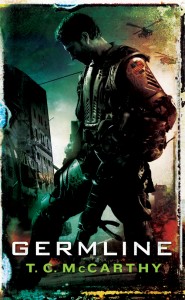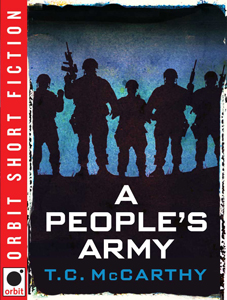Germline and Beyond: How my Short Fiction Links to the Subterrene Novels
 Caution: this isn’t a blog post about fiction as much as it’s a post about a weirdo. Me. Because you’d have to be weird to (a) hammer out three books in 1.5 years, (b) write one that wins a major genre award, and (c) figure it would also be easy to also generate a short story and two novelettes to compliment the books’ universe. But that’s exactly what I did. Why? Because people fascinate me in the number of ways they can be ridiculous and murderous, and sometimes I wonder: where will war take us in the future and will people ever change?
Caution: this isn’t a blog post about fiction as much as it’s a post about a weirdo. Me. Because you’d have to be weird to (a) hammer out three books in 1.5 years, (b) write one that wins a major genre award, and (c) figure it would also be easy to also generate a short story and two novelettes to compliment the books’ universe. But that’s exactly what I did. Why? Because people fascinate me in the number of ways they can be ridiculous and murderous, and sometimes I wonder: where will war take us in the future and will people ever change?
Germline, my first book and winner of the Compton Crook Award, is a gonzo-like account of futuristic front lines — the way an outsider sees things, someone not indoctrinated to the military lifestyle and who feels like a teenage outsider going in, an adult alien coming out. But where Germline is a coming of age story, Exogene is something different. Truth be told: I don’t know what it is. Exogene goes deep into the mind of the artificial, a manufactured human-like creature whose path to existence includes brutality too bizarre to be fiction. Some readers dig it. Wildly. Others can’t relate, and that’s just fine. The characters are strong women who find it difficult to tolerate incompetence or cowardice. Looking back, the main character, Catherine, took over the story and I had to follow her lead, a mind that dragged me in some strange directions. I was listening to a lot of The Distillers and Spinerette at the time so Brody Dalle may have seeped in through the cracks.
Then there’s Chimera. If Germline and Exogene are character studies about a man who can’t handle war and a girl who rejects it, respectively, then Chimera is a study of someone for whom war is a natural habitat: Stan Resnick. I’ve seen this. These types of soldiers exist — ones who genuinely thrive in settings that would make most of us want to huddle under a rock and stay there until everything dies down. And by the time writing began for Chimera, a few silly comments regarding Germline came in, comments suggesting it was an Apocalypse Now or Full Metal Jacket derivative (because anything that features a reporter from Stars and Stripes has to be channeling Full Metal Jacket, right?). Neither movie entered my thoughts in writing Germline. But to poke a finger in the eyes of these critics, I watched Apocalypse Now — over and over and over — and decided Chimera would address the enigma of Richard Colby.
He’s the counterpart to Martin Sheen’s character, the assassin who went up river just before Willard and who disobeyed orders by joining forces with Colonel Kurtz (instead of murdering him). What kind of a guy would do that? I asked, but knew the answer already. My guy, the one I wanted to take the lead in Chimera — an amalgam of people I’ve encountered throughout my life and career, the kinds of men and women who exist in a different dimension and calculate risk with a different set of assumptions than those used by you and me. Whereas Germline had absolutely nothing to do with Apocalypse Now, Chimera is inspired by it. On purpose. Let’s see if those same reviewers[*] figure it out…
 …which brings me to my Orbit Short Fiction. First, though: why even bother with shorter stories? Germline, Exogene, and Chimera examine three types of characters in war, and was there really much else to say about that world? Not really — not right away at least; I needed a break. So I could have stopped there and been happy except that something was still rattling in my head, an idea that wouldn’t go away until it shifted into a need, the need to expand temporally. To see the future. In short form, I would extrapolate the settings I’d laid out in the Subterrene trilogy to a point hundreds of years beyond. Imagine a universe seven hundred years from now where Earth governments exist in a similar form to the ones we know today but where instead of Earth-bound resources, we compete for ones outside our solar system. This is Subterrene v 2.0. Want to know what middle aged house moms will be doing in that future? They’ll join the Foreign Legion (obviously); just read “The Legionnaires.” Want to know how North Korea might survive and continue to cultivate believers in socialism, or how a growing South Korean economy might one day dominate interstellar politics? Read “A People’s Army” and then “Sunshine.”
…which brings me to my Orbit Short Fiction. First, though: why even bother with shorter stories? Germline, Exogene, and Chimera examine three types of characters in war, and was there really much else to say about that world? Not really — not right away at least; I needed a break. So I could have stopped there and been happy except that something was still rattling in my head, an idea that wouldn’t go away until it shifted into a need, the need to expand temporally. To see the future. In short form, I would extrapolate the settings I’d laid out in the Subterrene trilogy to a point hundreds of years beyond. Imagine a universe seven hundred years from now where Earth governments exist in a similar form to the ones we know today but where instead of Earth-bound resources, we compete for ones outside our solar system. This is Subterrene v 2.0. Want to know what middle aged house moms will be doing in that future? They’ll join the Foreign Legion (obviously); just read “The Legionnaires.” Want to know how North Korea might survive and continue to cultivate believers in socialism, or how a growing South Korean economy might one day dominate interstellar politics? Read “A People’s Army” and then “Sunshine.”
Each short piece ties into one of the Subterrene novels. The French Foreign Legion plays a major role in Germline, and “The Legionnaires” gives my readers a look at the brutality of the Legion’s future training regime. Catherine, in Exogene, encounters a band of North Koreans, barely surviving in a kind of fallout-contaminated no man’s land. “A People’s Army” turns a microscope on future North Korean forces and examines how true believers of the future Dear Leader could be created. Stan Resnick, in Chimera, chases after something insidious — a new line of genetic engineering research called Project Sunshine — but it’s not until the novelette, “Sunshine,” that my readers get a look at how horrifying the project really is. See the cover? Isn’t that awesome and creepy?
So to summarize: buy the books, buy the shorter fiction, and see one possible future…
Subterrene Short Fiction:
[*] Facts: (a) many reviewers don’t know anything about war except what they’ve seen in movies and (b) some of these have assumed (incorrectly) that my horizon is similarly limited.


